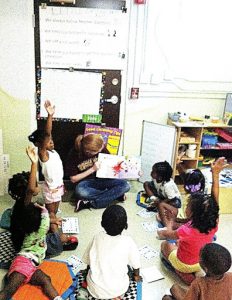This guest post by Anusha Subramanyam, PhD, BCBA-D and Tammy Kwan of Cognitive Toybox describes results from a pilot study in which Cognitive ToyBox, a game-based assessment program, was implemented in preschool classrooms to help teachers monitor their students’ progress.
Early childhood education programs require accurate, ongoing assessment to help students reach their school readiness goals. Our recent report, The Promise of Game-Based Assessment in Early Childhood Education, describes the challenge of current assessment systems and opportunities where direct assessment can help. It also provides pilot results from the 2017-2018 school year on how game-based direct assessment can reduce the assessment burden for teachers and increase teachers’ capacity to use data in real-time to improve instruction.

Head Start and most state-funded Pre-K programs mandate child-level assessment, and programs are given the choice between observation-based or direct assessment. But there are crucial problems with an observation-only approach: it can be burdensome for teachers, can introduce bias from teacher ratings, and can cause reliability issues between different teachers. Moreover, the lack of standardization makes it difficult for programs to compare classrooms and identify ways to improve.
Direct assessment, in which a teacher presents an individual child with tasks or questions, offers an alternative approach. Compared to observation-based assessment, direct assessment is more standardized, which can increase the reliability and validity of assessment (Snow & Van Hemel, 2008; Waterman et al., 2012). Direct assessment also allows for easy comparison across children, classrooms and programs (Waterman et al., 2012).
To explore the potential of direct assessment, a Head Start program in New York City that oversees six early childhood education centers piloted Cognitive ToyBox, a game-based assessment platform. Cognitive ToyBox enables preschool teachers to assess school readiness through touchscreen games. Teachers let children play the games for five minutes per week, and they automatically get access to reports with child-level assessment data. The Head Start program worked with the Cognitive ToyBox team to customize the assessment platform to fit their program’s needs before piloting with four Head Start teachers in the 2017-2018 school year. All four teachers had Master’s degrees in early childhood education, and were certified to teach Birth through Grade 2 in the state of New York. Each class comprised of 17-20 students, all of whom were 3 or 4 years of age. Students attended preschool up to 10 hours a day, five days a week, and all classrooms followed similar schedules. Below is a brief summary of the findings from the pilot:
Game data is consistent with educator evaluations: Scores from game-based assessments were correlated with children’s performance in other direct assessments, such as the Peabody Picture Vocabulary Test IV for preschoolers (r=0.60, N=36, m=3.4 years). Teachers also shared that the game data and scores were in line with their understanding of the classroom’s development level.
Game data gave teachers new insights on student development: One pilot teacher shared that in observing four to six children at a time during math small group, she often “missed kids”. She provided one example of a female student who was behind in language, and whom she had also assumed was behind in math. After reviewing the game-based assessments, she realized that the student was “a math whiz” and regrouped her appropriately. Without these results, the student would have remained in a mismatched instructional group, with potentially detrimental consequences. She risked starting school behind because she was inaccurately assessed.

Game data reduces assessment burden for teachers: In order to stay below the American Academy of Pediatrics screentime guidelines, each student engages with the assessment platform for an average of five minutes per week. Anecdotally, teachers have shared that the automatic documentation from the platform reduced their assessment time by 50% on a weekly basis.
Using a combination of observation and game-based direct assessments holds promise in reducing the burden on teacher time and improving the reliability and validity of early childhood assessment data. Moreover, structured, direct assessment allows for the development of reports and recommendations to understand how early childhood administrators can make improvements across a program level. Ultimately, better, simpler assessment reports will enable teachers to spend more time engaging in high-quality interactions to help every child thrive.
Read the full report here: The Promise of Game-Based in Early Childhood Education.
References
- Snow, C. E., Van Hemel, S. B., & Committee on Developmental Outcomes and Assessments for Young Children. (2008). Early childhood assessment: Why, what, and how. Washington, D.C: National Academies Press.
- Waterman, C., McDermott, P. A., Fantuzzo, J. W., & Gadsden, V. L. (2012). The matter of assessor variance in early childhood education – Or whose score is it anyway? Early Childhood Research Quarterly, 27(1), 46-54.

